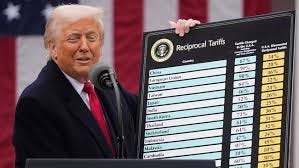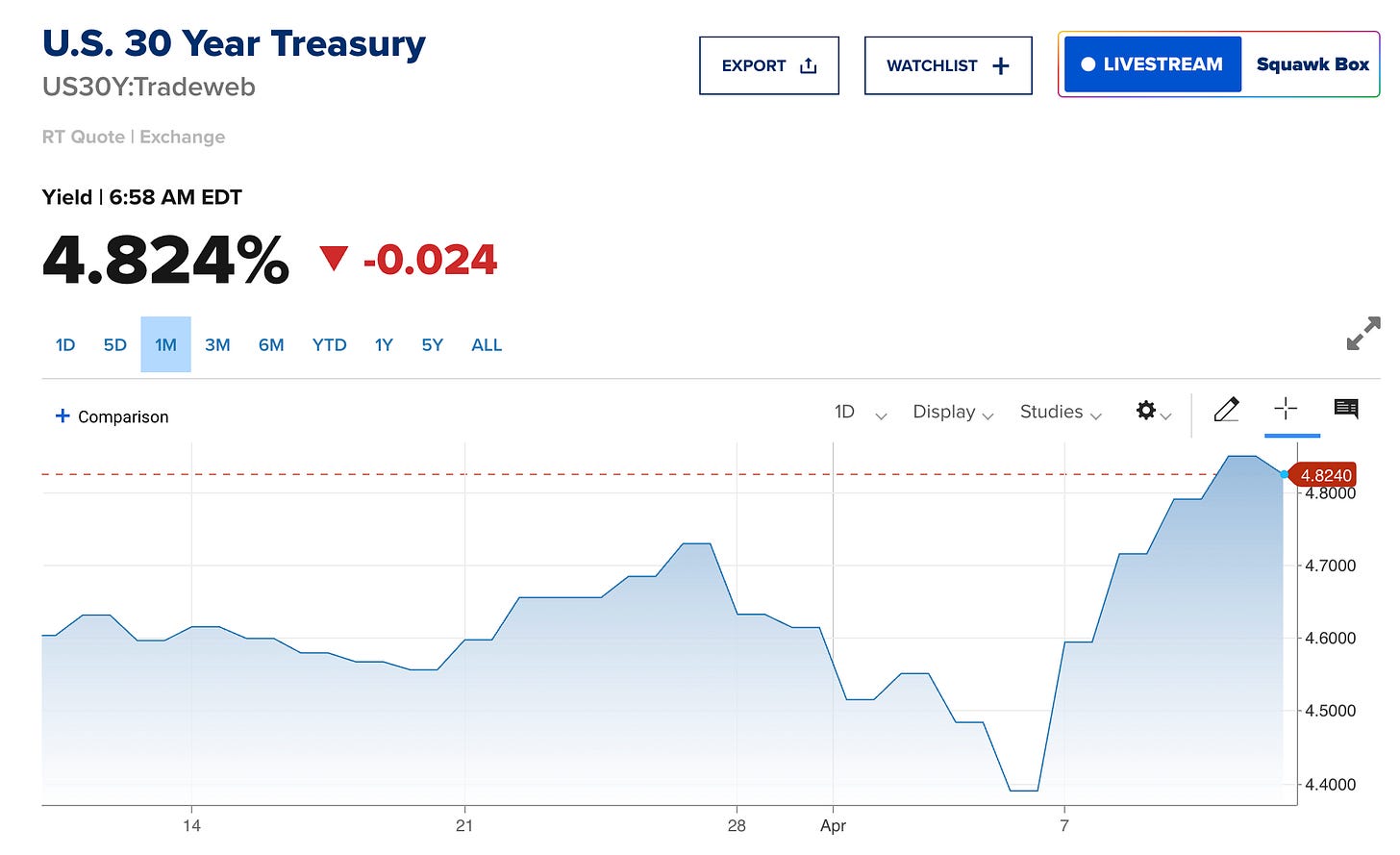Con Man Trump Imposes Crippling Tariffs on the World
After Causing Trillions of Dollars of Stock Losses, Trump Does a Back Flip
Trump, in full Con Man regalia, campaigned in the 2024 election promising to reduce consumer prices and to reduce inflation. He had no plan to achieve this goal, but he daily claimed that he would reduce inflation on Day 1 of his Administration II. News media never questioned him on how he would combat inflation. Maybe they asked an initial question, and then getting a Trump word salad response, failed to follow-up and press Trump on how he would achieve that goal.
But some voters were convinced that the Con Man meant what he said. But soon after he was elected, Trump said bringing prices down would be really hard, and he completely abandoned that goal. Those who voted for him, believing his promise, were left in the lurch.
Pretending to listen to his Treasury and Commerce Secretaries, Bessent and Lutnick, he held a Rose Garden event to announce his tariffs, holding up a large chart with tariff rates for various countries. There was no written explanation of the methodology used to derive the tariffs or the principles used in setting the rates. There were no written goals or policy objectives, just his beautiful tariffs. There was no discussion whether these rates were temporary or permanent.
The tariffs were much higher than anyone expected. China at 54%, Vietnam at 47%, E.U. at 20%, and Russia at 0%. Mexico and Canada were not included in the new list, but Trump said they would be subject to his paused 25% tariffs. There was a universal tariff of 25% on foreign cars and imported auto parts, and a 25% tariff on steel and aluminum.
The tariffs were to go into effect 1-3 days after announcement, so no real advance warning to give the world an opportunity to digest them and to calculate their effect.
As soon as the markets opened after the announcement, the world-wide reaction was almost instantaneous and highly negative.
Each of the U.S. averages fell quickly with the Dow Jones Industrial Average, the S&P 500, the NASDAC and the Russell 2000 all sinking quickly. Foreign markets were no better as Asian and European and other markets joined the rapid drop. After four days of trading the averages declined from 12% to 9% in that short time. Market losses were around $6 trillion. The declines did not slow down and continued ever lower.
On Wednesday, early in the morning, Trump posted on “Truth Social” that THIS IS A GREAT TIME TO BUY.” A few hours later, after various meetings, Trump did a back flip and paused all of the tariffs above 10% except for China, which had the temerity to impose a reciprocal 34% tariff on U.S. exports to match the 34% tariff on Chinese exports. There followed a tit for tat acceleration of tariffs which ended with Trump imposing a 145% tariff on China, and China imposed an 89% tariff on the United States.
After Trump’s pause, the stock averages shot up, and some wonder whether Trump and his friends and colleagues had advance notice of the abrupt flip and were able to earn huge profits. Was there market manipulation or insider trading?
David Brooks, the New York Times Opinion columnist, in a column on the decline in education and thinking in the U.S., wrote:
What happens when people lose the ability to reason or render good judgments? Ladies and gentlemen, I present to you Donald Trump’s tariff policy. I’ve covered a lot of policies over the decades, some of which I supported and some of which I opposed. But I have never seen a policy as stupid as this one. It is based on false assumptions. It rests on no coherent argument in its favor. It relies on no empirical evidence. It has almost no experts on its side — from left, right or center. It is jumble-headedness exemplified. Trump himself personifies stupidity’s essential feature — self-satisfaction, an inability to recognize the flaws in your thinking. And of course when the approach led to absolutely predictable mayhem, Trump, lacking any coherent plan, backtracked, flip-flopped, responding impulsively to the pressures of the moment as his team struggled to keep up.
Producing something this stupid is not the work of a day; it is the achievement of a lifetime — relying on decades of incuriosity, decades of not cracking a book, decades of being impervious to evidence.
This morning, April 11, the escalation increases as China has raised the tariff on U.S. goods to 125%. This will stop the sale of soybeans and other farm products to China as happened in the Trump I tariff, and that resulted in a $34 million bailout program for farmers who were unable to sell their crop to their biggest buyer. How much will Trump have to pay farmers to compensate them for the major loss resulting from a 125% Chinese tariff?
Trump operates under the false idea that anytime a country has a trade surplus with the U.S. they are cheating. But a trade deficit results when a country does not buy from the U.S. as much as the U.S. buys from that country. Vietnam sells clothing and shoes to the U.S., but they are not able to purchase an equivalent amount of goods from the U.S. due to the size of their economy. Vietnam has exports because their wage rates are lower than the U.S., and the U.S. is not about to re-enter the market to produce low cost clothing and shoes. Apple assembles IPhones in China, and Peter Navarro said the other day that Trump’s tariff program will allow construction of factories in the U.S. where workers can insert little screws into IPhones. Is he serious?
Paul Krugman, the Nobel prize winner in economics, has a very negative view of Trump’s tariff policy, similar to Mr. Brooks:
It’s hard to overstate the craziness of announcing a radical tariff plan, then announcing a quite different but equally radical plan just a week later. Furthermore, the claim that the wild zigzags in policy were always part of Trump’s plan just adds to the destruction of the administration’s credibility.
But are these tariffs just an opening gambit for trade negotiations? I doubt it. Bear in mind that Trump and Peter Navarro, his tariff guru, start from the premise that other countries are cheating, that they’re taking advantage of America and treating us unfairly. In fact, however, most of them aren’t. Take the case of the European Union. The EU imposes an average tariff on U.S. goods of just 1.7%, and there aren’t any significant hidden barriers.
So what are we supposed to be negotiating about? Nations can’t promise to lower their trade barriers when there aren’t any barriers. Navarro has been claiming that value-added taxes are de facto tariffs, but they aren’t, and EU nations literally can’t afford to give them up.
Do Trump and Navarro think they can force the E.U. to radically change their tax structure eliminating VAT taxes because the U.S. says so? Highly doubtful.
Krugman continues,
In fact, savvy traders have realized that there’s no coherent economic strategy. There’s an old line about military analysis: “Amateurs talk about tactics, but professionals talk about logistics.” Well, when it comes to taking the pulse of financial markets, amateurs talk about stocks, but professionals talk about bond and currency markets. That’s because bond and currency markets are generally less driven by emotion. There’s no “meme
gamblinginvesting” in bond and currency markets. And these markets are both signaling major loss of faith in America.
Currency markets are expressing lack of confidence in Trump’s tariffs:
For example, economic theory and history both say that the imposition of tariffs normally leads to a stronger currency unless other countries retaliate. During his confirmation hearing Scott Bessent, the incoming Treasury secretary, argued that a 10 percent tariff would lead to something like a 4 percent rise in the dollar. But not this time. Instead of going up, the dollar has plunged.
Source: xe.com
The obvious explanation is that crazy policies have shaken investors’ faith in America, which has traditionally been viewed as a safe haven.
That is a dramatic fall in the value of the dollar. Alarm bells should be ringing.
How about the bond market? It was reported that the increase in the 10 year Treasury bond yield was a major reason that Trump changed course. So, how is the 30 year Treasury doing? Krugman continues,
The key point is that massive tariffs have disrupted the plumbing of the financial system, leading to soaring interest rates on U.S. government debt. That’s abnormal: rising odds of a recession usually lead to falling long-term interest rates, because the prospect of a recession raises the likelihood of future cuts by the Fed, which controls short-term rates. This time, however, rates are spiking, especially for very-long-term instruments like 30-year bonds, shown at the top of this post.
Source: CNBC
Trump has claimed that his tariff strategy will lead to construction of new factories producing semiconductors. The CHIPS Act, enacted under president Biden, provides financial assistance for construction of U.S, based factories. But Trump has criticized the CHIPS Act, probably for the sole reason that it was adopted by Biden, while also lauding Taiwan Semiconductors plans to build a semiconductor factory in the U.S. using CHIPS Act assistance. Further evidence of Trump going off the rails.
And back to the tit for tat world, the New York Times reports that:
China issued new regulations on Friday that will subject semiconductors made by U.S. firms to higher tariffs. The measures will put pressure on companies like Intel, Global Foundries and others who have U.S. chip factories, potentially encouraging chip companies to shift manufacturing out of the United States to maintain access to the Chinese market, where the bulk of global electronics are made.
So Trump’s trade war is going full steam ahead. Is Trump actually negotiating any trade deals? The best deal would be to return to the status quo ante when tariffs were actually low and the U.S. economy was accelerating while inflation was subsiding. But Trump is committed to his view of tariffs even though it is rejected by most economists. So Trump will probably continue his trade war. The Mad Man in the Oval Office has already said that he does not care if tariffs increase inflation and the cost of goods.






When economic policy is made by ego, not strategy, the market doesn’t just react,it revolts.